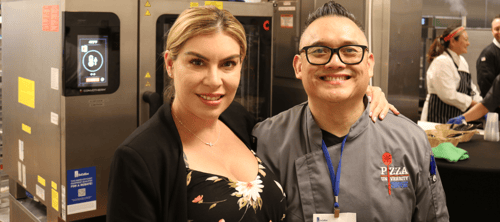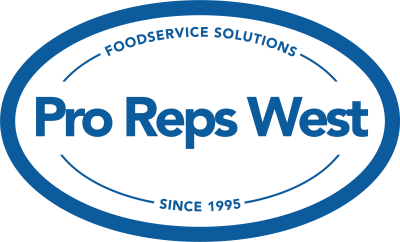Culinary Q&A: Meet Chef Mike Corlett
Category
We're only as good as our people, and that's why the team at Pro Reps West has assembled culinary talent that can help any type of commercial or industrial foodservice operator become more efficient and profitable. We recently sat down with Chef Juno Ignacio, and now we're turning our attention to Chef Mike Corlett.
Join us as we learn more about Chef Mike, with topics ranging from the future of foodservice to overcoming life's disappointments. Chef Mike is an amazing guy. Here's why.
 Hi Mike, let's start by discussing how you entered the culinary field.
Hi Mike, let's start by discussing how you entered the culinary field.
Chef Mike: My decision to pursue a career in the culinary arts evolved from a big-picture lifestyle choice. In 1995 I decided to become a vegan. My reasons for doing so are many and varied, but that’s another story.
In terms of how it affected my day-to-day life, however, it was eye-opening, to say the least. I immediately had to come to terms with the fact that vegan cuisine in Orange County, California, circa 1995, was incredibly bland and unimaginative. And as someone who had always loved cooking and being creative in the kitchen, I became obsessed with vegan cooking and trying different approaches beyond poorly cooked slimy tofu, steamed broccoli and brown rice.
My pursuit led me to Northern California, where I was determined to find a decent vegan restaurant. And on Valentine’s Day in 1998, I had a multi-course vegan aphrodisiac meal at the Millennium in San Francisco with my future wife featuring hearts of palm, a dark chocolate tart and the most amazing phyllo dough “purse” filled with a wild mushroom confit that blew my mind. It was clear to me that whoever created this food came from a classic French technical background, and if I wanted to elevate my own cooking to this level, I needed to go to culinary school and turn my passion into a career. I toyed with the idea for a couple of years, then, in 2000, I finally pulled the trigger. My then-wife supported me fully, and the rest is, as they say, history.
What about your expectations? Is there something that has completely lived up to what you thought it would be like working in the foodservice industry?
I had some great instructors at the Art Institute that prepared me for what to expect in the foodservice industry. They warned me about the daily grind and the toll it takes on your body and mind. But the one thing they kept coming back to that holds true to this day is that if you lack the passion for the pursuit of amazing food and can’t access that passion for everything you do in the kitchen, you need to find a different career path. I’ve seen people get beat down and stop caring and just basically become a foodservice mercenary. I’ve also seen people like Chef Juno, who, on the 12th hour of non-stop cooking, still gets excited for that perfect lamb chop. It’s a bit cliché but so true that it is the passion for food that separates the cooks from the chefs.
Have there been any disappointments?
There are always disappointments in life. I was disappointed that my catering business never really took off! I had a sweet gig after culinary school working for a high-end rehab that allowed me to create my own menus featuring spa cuisine that lasted seven years. I was disappointed when that venture failed. The great thing about cooking for a living, however, is that people will always get hungry again, and you will always have another crack at impressing with your craft in one way or another. The way I see it is any disappointments or perceived failures I’ve encountered have led me on the path to working for Pro Reps, which is basically a dream chef job, so it’s all good in the end.
 Who are your biggest influences today? Do you follow the careers of any local chefs?
Who are your biggest influences today? Do you follow the careers of any local chefs?
My first great influence was the chef for the Millenium restaurant, Erik Tucker. He was one of the pioneers of vegan cuisine, which was my first love. I did a short stint for Native Foods in Costa Mesa, another vegan restaurant back in 2003, and the founder, Chef Tanya Petrovna, was a huge influence on me. She now has her own concept based in Palm Springs called Chef Tanya’s Kitchen. Thomas Keller has always been a hero of mine. I have a few of his cookbooks but have never actually eaten at one of his restaurants.
What makes them great?
Chef Erik Tucker and Chef Tanya Petrovna just have such a clear vision and a fearlessness when it comes to bucking the norm. I mean, the Millennium is a fine dining restaurant in one of the greatest food cities on Earth featuring no meat and no dairy. Native Foods is a vegan fast-casual concept that Chef Tanya opened in conservative Orange County 20 years ago when most people didn’t even know what vegan meant. Thomas Keller has an attention to detail that is unmatched, and his adherence to classical technique combined with a modern approach is incredible.
How do you feel about the industry as a whole? Where do you think we're at today, and where are we headed?
The industry as a whole is thriving. People have become much more adventurous when it comes to dining. This has led to operators from different cultures featuring all different types of cuisines finding success and gaining popularity. More and more people are talking about food and new experiences with different types of food and recommending restaurants through social media and word of mouth. As this continues, it bodes well for the future, and we will start seeing more and more diversity and people becoming interested in authentic and interesting foods from all around the world.
What are the top challenges operators face today? And how can you see foodservice equipment helping to solve them?
The lack of skilled labor is a huge issue. The pandemic, unfortunately, led to many experienced operators leaving the business, and the owners of these establishments are having a hard time finding people that can adequately fill the void. Luckily for them, the modern technology incorporated into the equipment of today offers programmability and amazing cooking platforms that help bridge the gap. It used to be that you can trust that one guy who only works on Tuesdays and Thursdays to properly cook the Chicken Parmesan. Nowadays, your minimum wage operator can just find the cooking program on the touchscreen of your combi oven that says “Chicken Parmesan,” load the product, push the button and it will come out perfect every time. The result is cheaper labor, less food waste, more consistent product and just an overall more efficient kitchen.
Do you encourage operators to demo different types of equipment before purchasing? Why is that important?
Whenever available we always recommend trying before you buy. More specifically trying the equipment with your own specific food product. You want to take the guesswork out of the equation, and if you can have positive results with your own food product in a given piece of equipment, it will give you confidence that you are making the right decision with your purchase. I would never buy an expensive car without test-driving it. The same approach should apply to foodservice equipment.

Pro Reps West has recently opened a great culinary resource called The Wedge. Tell us a little about it.
The Wedge is our brand-new state-of-the-art test kitchen in Costa Mesa. It is a practical yet warm and inviting commercial kitchen space, where we welcome foodservice operators to utilize as a resource for testing out equipment from our factories. We have a huge prep area in addition to our hood space which features water lines, floor drains, gas lines, and a variety of electrical configurations. All the connections are on quick disconnects and all our equipment is on casters, so we can swap out equipment easily and create basically any type of line-up we want. We also have a couple of flatscreens mounted on our hood, which we can run power points, videos, Monday Night Football, et al. It is basically a chef’s playground, and Chef Juno and I are so excited to share it with our local Foodservice community. The Pro Reps staff is pretty stoked, as well, because when we are there, which is every chance we get, there is going to be some amazing food available.
The name The Wedge is derived from the concept of two powerful forces coming together to create an even greater force. The idea for the name came about from our proximity to the famous surf break in Newport Beach called…..you guessed it, The Wedge. When conditions are right at the Wedge, a wave approaches the shore at the proper angle and will reflect off the man-made jetty creating a second wave which basically becomes a double wave. So the idea of us partnering with foodservice operators to generate a powerful force felt like a natural analogy. From there it was an easy jump to adopting an ocean aesthetic throughout the facility which for me as a lifelong surfer, makes for a very cool and comfortable environment.
What's the one piece of equipment you'd encourage all end users to consider?
That is kind of hard to answer without knowing the menu. All equipment recommendations start with what you are cooking. However, if you can work out the proper utilizes for it, a combi oven will prove to be the most versatile piece of equipment in the kitchen. Just from a pure cooking standpoint, it gives the operator to steam, bake, roast, braise, cook to the exact internal temperature, cook low and slow overnight, smoke foods, dehydrate, et al. From an efficiency standpoint, combi ovens are fully programmable so once the chef creates the ideal cooking parameters for a given dish, anyone in the kitchen can cook the dish to the chef’s specifications with a touch of a button. Also, when in combi cooking mode, you get faster cook times and higher moisture retention with the inclusion of humidity inside the cavity. What is important in the high-paced world of foodservice is quality, consistency, labor savings, fast cook times, and ease of use per the labor issues I discussed above. Combi ovens help with all of that across the board.
Chef Mike, thanks so much for telling us a bit about yourself and your take on the foodservice industry. How can people learn more about you and leverage your foodservice knowledge to help their businesses?
Stop by The Wedge and join up with another powerful force!
.png?width=3013&height=1826&name=PRW%20Badge%20White%20BG%20(1).png)

.png?width=500&name=Pro%20Reps%20West%20PRW%20Celebrates%20Relaunch%2c%20Values%2c%20and%20Mission%20Header%20(1).png)

.png?width=500&name=prw%20invited%20to%20the%20wedge%20hero%20(1).png)
